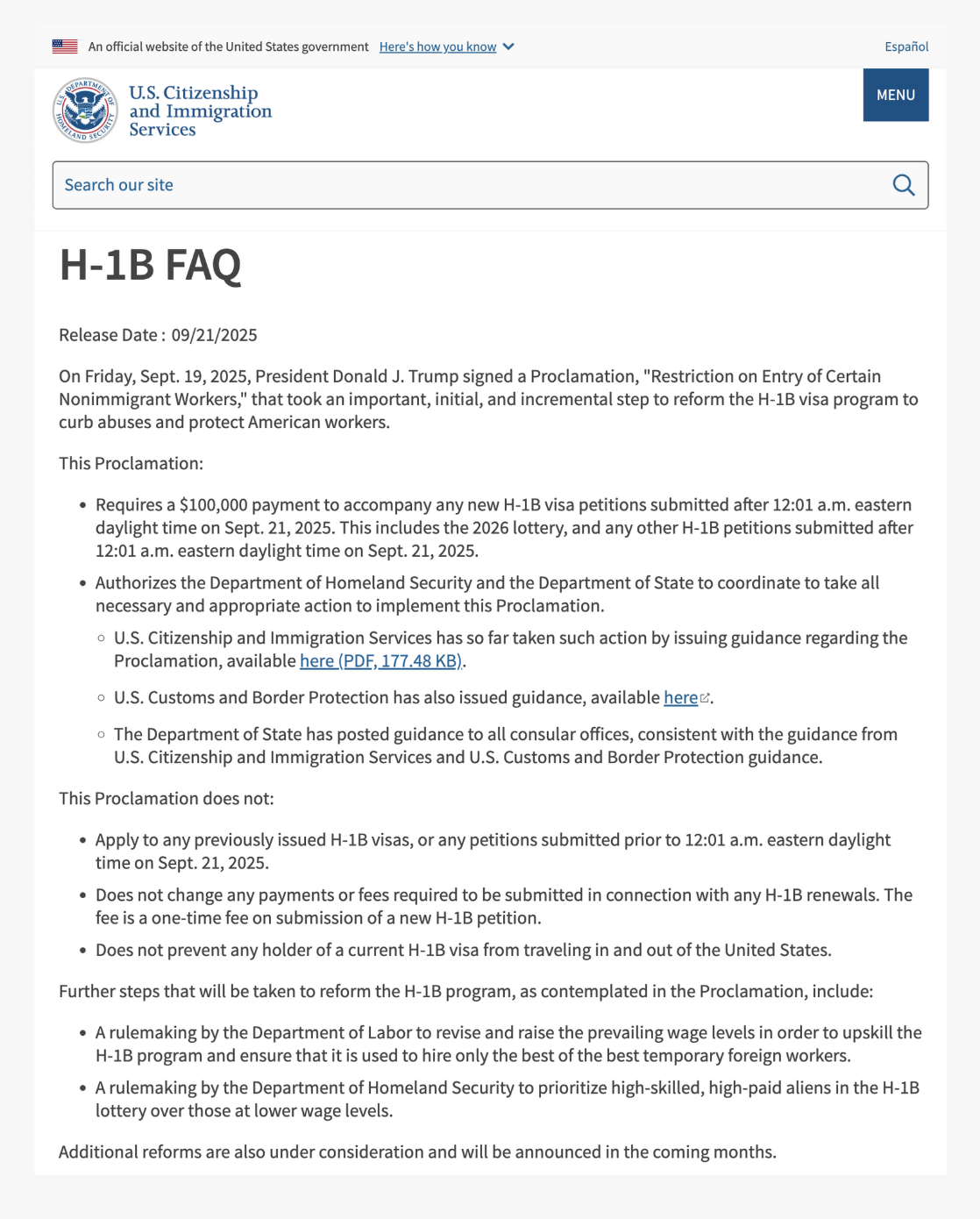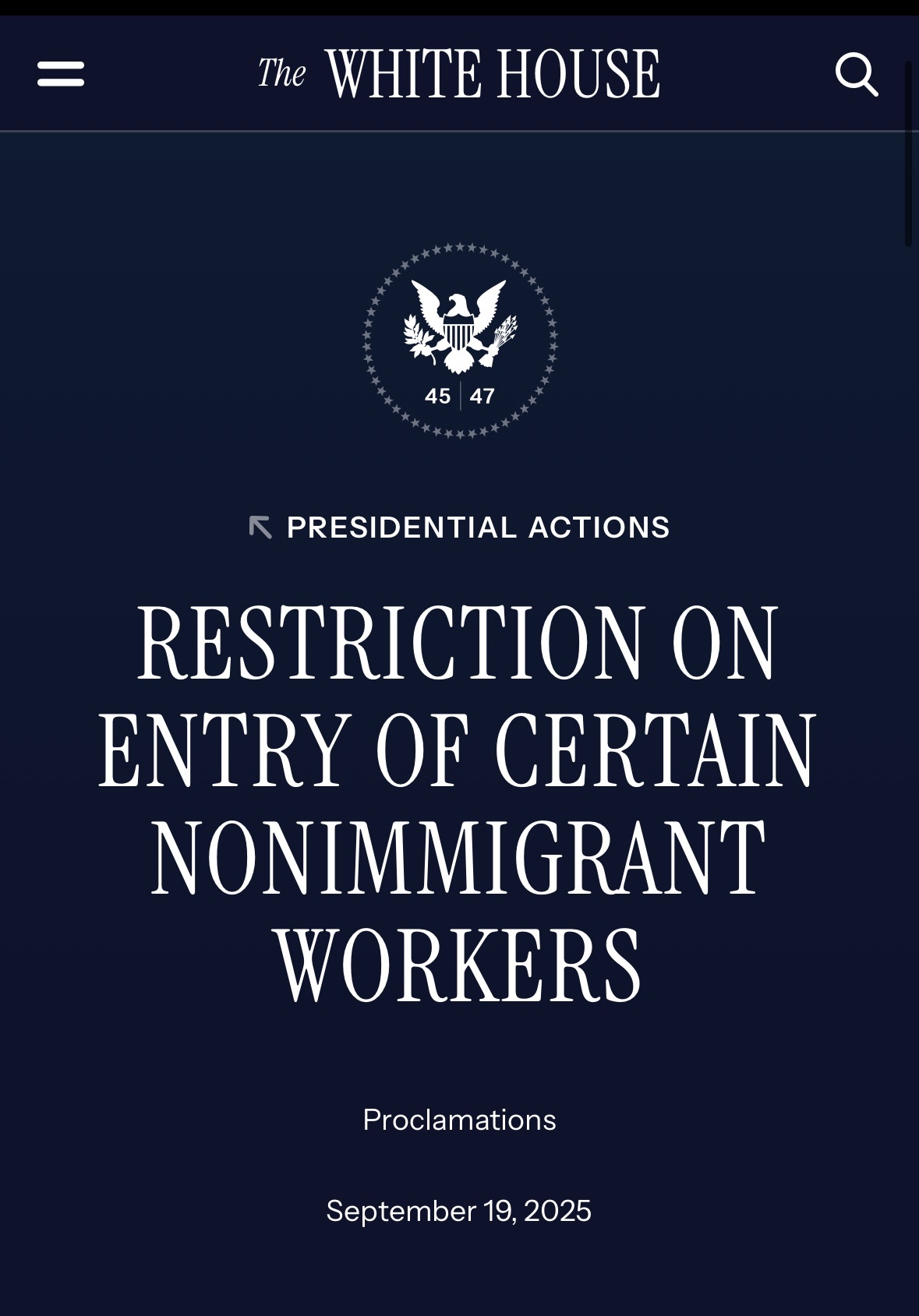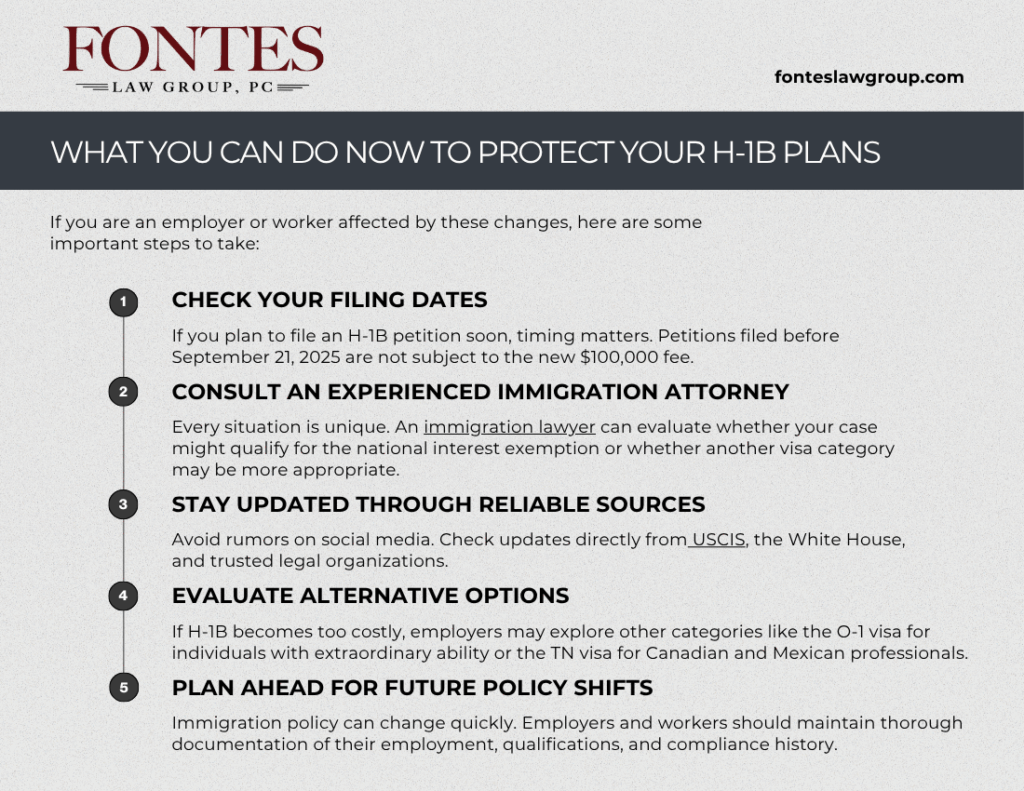$100K H-1B Application Fee and New Restrictions: What It Means for You
For decades, the H-1B visa program has allowed skilled workers from around the world to build careers in the United States. But in September 2025, that pathway became much more expensive and complicated.
Under a new federal rule, employers filing new H-1B petitions after September 21, 2025, must now pay an additional $100,000 supplemental fee to the government.
This major change, part of the administration’s revised immigration policy, has raised serious questions for both foreign workers and the businesses that depend on their talent.
At Fontes Law Group, our immigration lawyers know how disruptive policy shifts can be, especially for professionals and families who have built their lives in the U.S.
This article explains what’s actually changing, who it affects, and what steps you can take right now to protect your plans.
What the New Rule Says

According to the U.S. Citizenship and Immigration Services (USCIS), the new regulation introduces a $100,000 supplemental filing fee for certain nonimmigrant worker petitions, including the H-1B visa.
Here’s what’s confirmed so far:
- The new fee applies only to new H-1B petitions filed on or after September 21, 2025.
- The fee is one-time, not annual.
- The rule does not apply to petitions that were already pending or approved before that date.
- Current H-1B visa holders do not need to pay the fee for extensions, transfers, or amendments.
- Certain petitions may be exempt if they qualify under a “national interest” exception, as outlined in the White House announcement.
- Employers that do not pay the supplemental fee will not have their petitions approved, and some applicants may be barred from entry until the payment is made.
In short, this is one of the most expensive changes ever introduced to the H-1B visa process, and it is reshaping how companies think about hiring foreign professionals.
Why This Is Happening
The administration claims the new fee will generate revenue to “protect American workers” and fund oversight of employment-based visa programs.
However, immigration law experts note that the rule may have little to do with oversight and more to do with limiting access to the H-1B program. Large tech firms and startups alike rely heavily on H-1B visas to fill critical roles in software engineering, research, healthcare, and other specialized fields.
According to CBS News, officials stated that the measure aims to discourage “abuse” of the system, but critics argue that it disproportionately hurts smaller employers who can’t afford the massive cost increase.
Legal experts have noted that the rule could raise questions under the Administrative Procedure Act (APA) if it was not issued through the required public notice and comment process.
Who Will Be Affected
The $100,000 H-1B fee primarily affects:
- Employers filing new H-1B petitions for foreign workers.
- Workers who are applying for the first time under the H-1B category.
- Cap-subject cases, including those selected in the annual H-1B lottery.
It will not affect:
- Workers who already have valid H-1B status.
- Petitions filed before September 21, 2025.
- Cap-exempt employers (such as universities or nonprofit research institutions).
- Renewals, extensions, or amendments for existing H-1B holders.
That means an engineer in California already on H-1B status is safe for now, but an employer hoping to bring a new worker from abroad would face enormous new costs.

The National Interest Exception
The rule includes a “national interest exception” that allows the government to waive the $100,000 fee under limited conditions.
According to the White House Presidential Proclamation on H-1B Visas, exemptions may apply when an applicant’s work is considered essential to U.S. national security, supports critical infrastructure, or contributes to the nation’s economic recovery.
The proclamation also allows federal agencies to deny entry or revoke eligibility if an applicant or employer is determined to pose a national security threat.
The Departments of State and Homeland Security are responsible for defining the specific criteria for these exceptions and enforcement standards.
These exemptions are not automatic. Employers must submit detailed documentation showing how the applicant’s role meets one of these national interest requirements.
Because the government has not yet released detailed guidance on how these exceptions will be applied, immigration attorneys recommend proceeding carefully and preparing strong supporting evidence when requesting a waiver.
Why Immigration Attorneys Are Concerned
Immigration lawyers and business advocacy groups are questioning both the legality and practicality of the new rule.
For employers, the increase represents a massive financial burden, particularly for small and mid-sized companies. Most already pay several thousand dollars in filing fees per employee, plus attorney costs.
For workers, the change creates an uneven playing field. Highly skilled professionals who might once have been sponsored by smaller firms could now see those opportunities vanish.
Legal experts also predict a wave of court challenges, arguing that the administration failed to follow proper administrative procedures. Until those challenges are resolved, uncertainty will likely continue for months.
“The new H-1B filing fee adds another layer of complexity for both employers and workers, with the right legal strategy and preparation, employers and professionals can still move forward and reach their immigration goals.”
Attorney Martin C. Fontes – Immigration Lawyer
Broader Impact on California Workers and Businesses
California is home to some of the country’s largest concentrations of H-1B workers, especially in tech hubs like Silicon Valley, Irvine, and San Diego.
The new rule may lead some companies to delay hiring, shift roles abroad, or reduce sponsorships altogether. Startups, in particular, could struggle to compete with larger corporations that can absorb the cost.
In an open letter to the administration, the U.S. Chamber of Commerce urged officials to reconsider the $100,000 H-1B supplemental fee, warning that it would create unnecessary barriers for employers and weaken the nation’s competitiveness in key industries.
For the thousands of families living in Southern California under H-1B status, these shifts also create personal uncertainty, from visa renewals to future green card sponsorships.
What You Can Do Now

How Fontes Law Group Can Help
At Fontes Law Group, we understand how immigration rules affect real lives, not just applications. Our bilingual immigration attorneys have guided professionals, families, and employers through complex immigration changes for years.
We represent clients across Santa Ana and Riverside, offering personalized, step-by-step legal support. Whether you are a worker hoping to maintain your status or an employer navigating new compliance costs, we can help you understand your rights and plan your next move.
Our goal is to make sure you stay informed, protected, and ready for what comes next.
FAQs About $100K H-1B Application Fee
Q: Does the $100,000 fee apply to renewals or transfers?
No. The fee applies only to new H-1B petitions filed on or after September 21, 2025.
Q: I already have an H-1B visa. Will I be affected?
No. If your petition was approved before that date, you are not required to pay the new fee.
Q: Can small businesses apply for an exemption?
Possibly. Employers may request a national interest waiver, but it is reviewed case by case and must be strongly supported by evidence.
Q: Will there be lawsuits against this rule?
Yes. Several advocacy groups and business coalitions have signaled plans to challenge the rule under the Administrative Procedure Act. Outcomes are pending.
Q: Is there a chance this fee will be reversed?
It is possible, but not guaranteed. Until a court or future administration changes the rule, it remains in effect.
Helpful Resources
U.S Department of State H-1B FAQ
U.S. Citizenship and Immigration Services (USCIS)
White House – Presidential Action on H-1B Visas
CBS News – $100,000 H-1B Fee Announcement
Bottom Line
The $100,000 H-1B filing fee is one of the most significant changes to employment-based immigration in years. While the policy is aimed at limiting new applications, its impact will reach far beyond large tech firms, affecting small employers, skilled professionals, and their families across the country.
If you are worried about how this rule might affect your job or your business, you do not have to face it alone.
Fontes Law Group offers bilingual legal guidance for individuals and employers throughout Southern California. We will help you understand your options, evaluate risks, and plan for what comes next.
Need help understanding how the new H-1B fee affects your case? Contact Fontes Law Group today for a confidential consultation.
